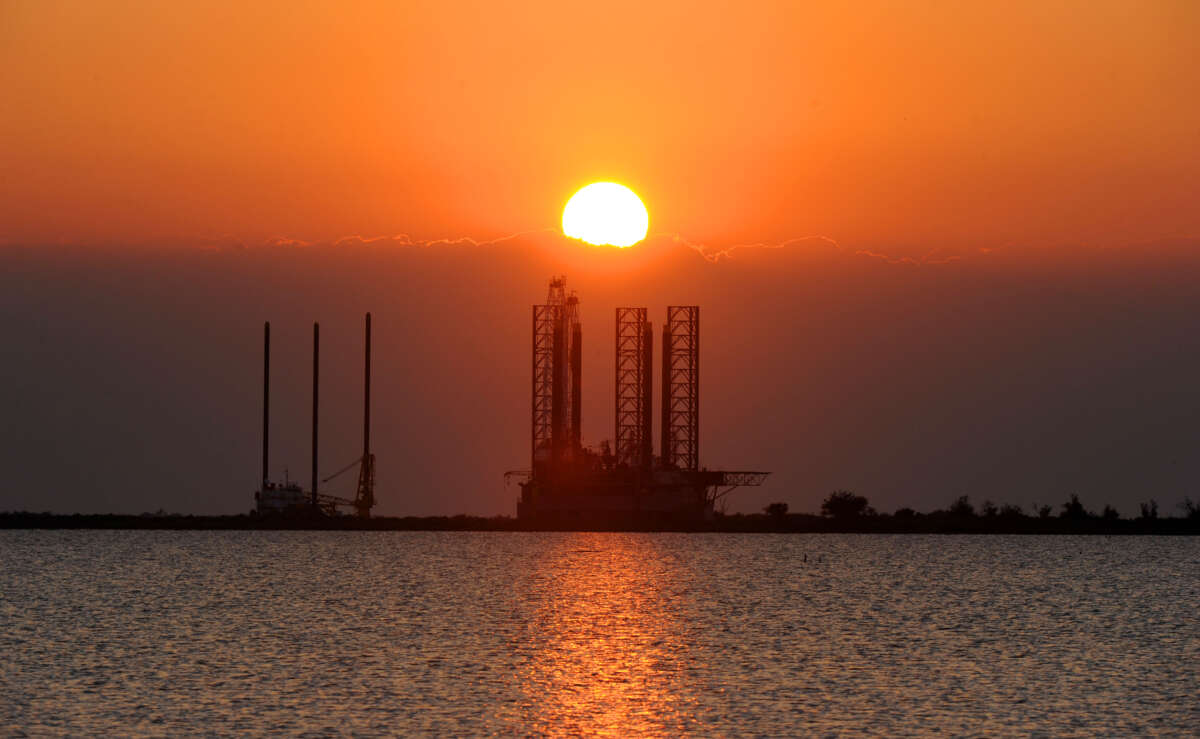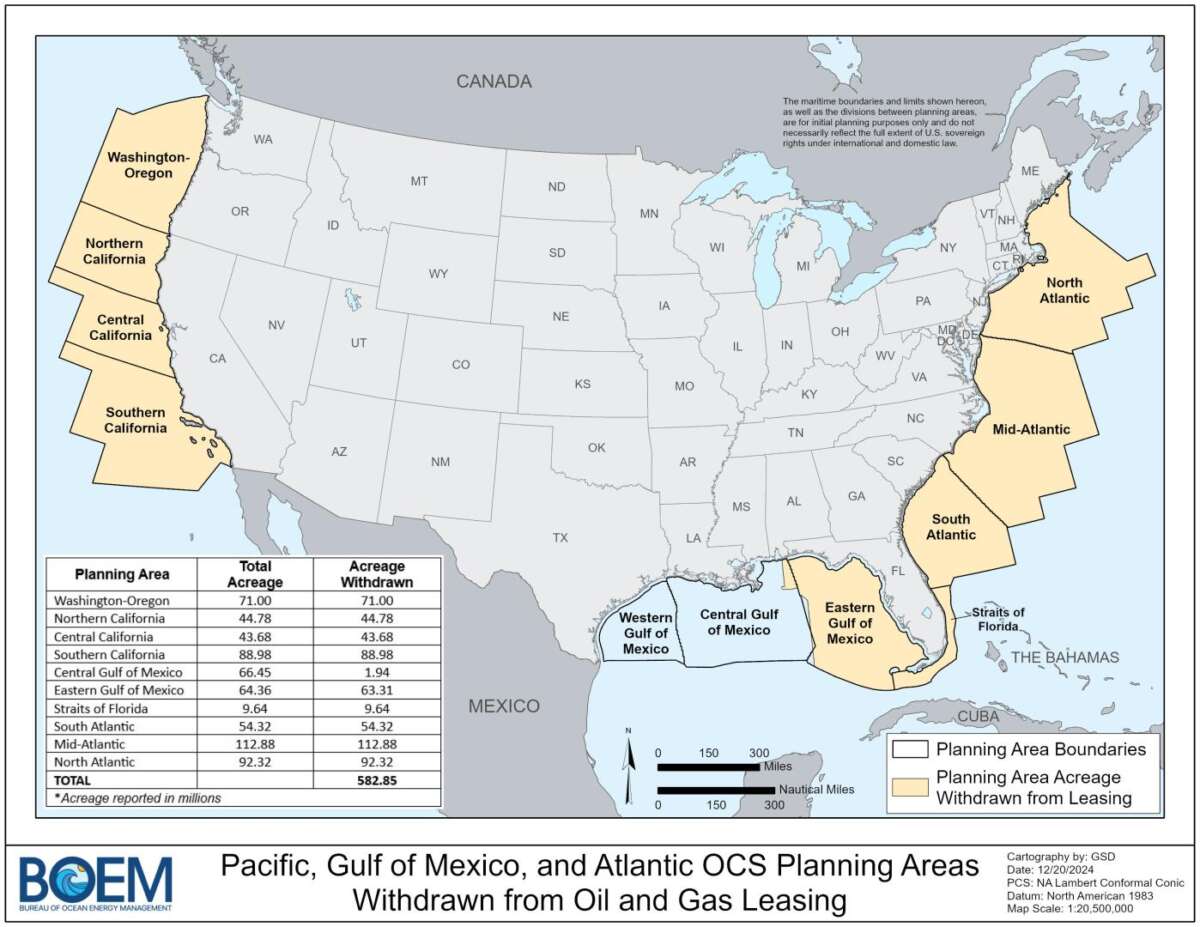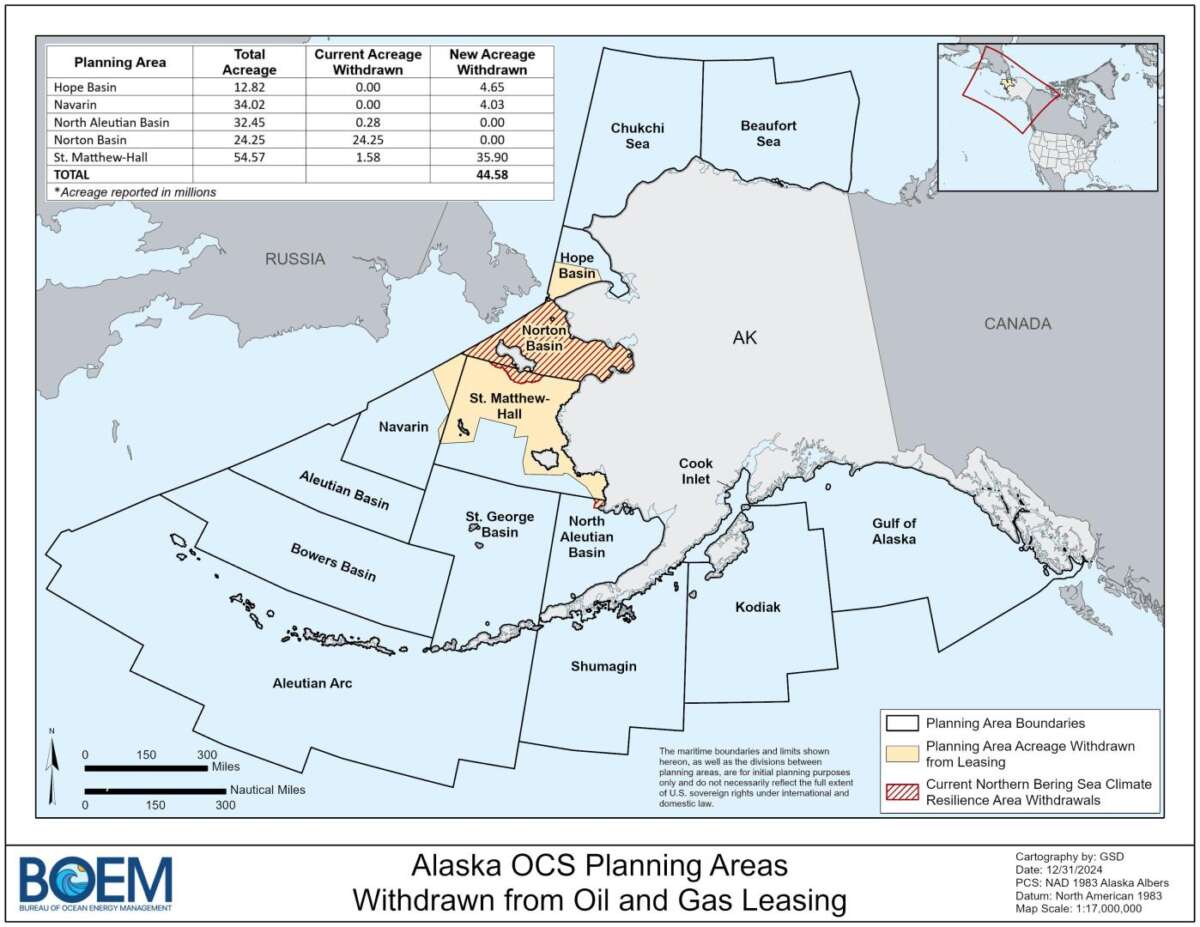Biden’s Offshore Drilling “Ban” Won’t Protect Gulf of Mexico From Oil Spills
Biden invoked the 2010 BP oil spill, but his ban doesn’t include the area of the Gulf where the spill occurred.
By Mike Ludwig , TruthoutPublishedJanuary 7, 2025

The sun sets over an oil platform waiting to be towed out into the Gulf of Mexico at Port Fourchon in Louisiana
Mark Ralston / AFP via Getty Images
Democrats in Congress cheered as President Joe Biden moved on January 6 to withdraw 625 million acres federal ocean waters off United States coastlines from consideration for future offshore oil and gas drilling. Democratic lawmakers say the waters are “permanently” protected, although Republicans could use their majority in Congress to force the government to lease underwater drilling rights to the industry.
However, Biden’s last-minute effort to secure his climate legacy before Donald Trump takes office does nothing to prevent offshore drilling in the central and western Gulf of Mexico, where intense fossil fuel exploitation already causes pollution and oil spills as climate change brings intensifying floods and storms to coastal communities.
In a statement, Biden called the massive BP oil spill that devastated the Gulf of Mexico in 2010 a “solemn reminder” of the risks offshore drilling poses to fisheries and coastal communities — but the area of the Gulf where the spill occurred is not protected under Biden’s executive action.
According to a White House fact sheet, Biden is using his authority under federal law to withdraw from future oil and gas lease sales all federal ocean waters off the East and West coasts, the eastern Gulf of Mexico, and additional portions of the Northern Bering Sea in Alaska. The Interior Department regularly leases vast swaths of public lands and waters to private companies for oil and gas production, including in the Gulf of Mexico, where the industry has left hundreds of out-of-use wells and drilling platforms to rust in the open sea.
Under Biden’s current executive action, the deep central region of the Gulf — where the deadly Deepwater Horizon explosion unleashed roughly 134 million gallons of oil in 2010 — will remain open for current and future oil and gas drilling, along with western Gulf waters off Texas and Louisiana.
However, Biden’s last-minute effort to secure his climate legacy before Donald Trump takes office does nothing to prevent offshore drilling in the central and western Gulf of Mexico, where intense fossil fuel exploitation already causes pollution and oil spills as climate change brings intensifying floods and storms to coastal communities.
In a statement, Biden called the massive BP oil spill that devastated the Gulf of Mexico in 2010 a “solemn reminder” of the risks offshore drilling poses to fisheries and coastal communities — but the area of the Gulf where the spill occurred is not protected under Biden’s executive action.
According to a White House fact sheet, Biden is using his authority under federal law to withdraw from future oil and gas lease sales all federal ocean waters off the East and West coasts, the eastern Gulf of Mexico, and additional portions of the Northern Bering Sea in Alaska. The Interior Department regularly leases vast swaths of public lands and waters to private companies for oil and gas production, including in the Gulf of Mexico, where the industry has left hundreds of out-of-use wells and drilling platforms to rust in the open sea.
Under Biden’s current executive action, the deep central region of the Gulf — where the deadly Deepwater Horizon explosion unleashed roughly 134 million gallons of oil in 2010 — will remain open for current and future oil and gas drilling, along with western Gulf waters off Texas and Louisiana.

Biden’s executive action withdrew federal waters in the Atlantic and Pacific Oceans, as well as the Eastern Gulf of Mexico, from leasing consideration for potential offshore oil and gas drilling.Bureau of Ocean Energy Management
During his first weeks in office, Biden attempted to temporarily pause offshore oil and gas leasing in the Gulf but was met with legal challenges from the industry. Biden’s latest executive action does protect the eastern Gulf, which the industry has eyed for years, but a moratorium on drilling meant to protect Florida’s tourism industry and pristine beaches has been in place for years and would have not expired until 2032.
Globs of oil and dead marine life from the 2010 oil spill still washed up on Florida beaches despite the moratorium on drilling in the eastern Gulf enacted by Congress in 2006. Tourism plummeted from Miami to New Orleans, Louisiana. Martha Collins, executive director of the watchdog group Healthy Gulf, said the Gulf of Mexico is one body of water that cannot be artificially divided by policymakers.
Related Story
During his first weeks in office, Biden attempted to temporarily pause offshore oil and gas leasing in the Gulf but was met with legal challenges from the industry. Biden’s latest executive action does protect the eastern Gulf, which the industry has eyed for years, but a moratorium on drilling meant to protect Florida’s tourism industry and pristine beaches has been in place for years and would have not expired until 2032.
Globs of oil and dead marine life from the 2010 oil spill still washed up on Florida beaches despite the moratorium on drilling in the eastern Gulf enacted by Congress in 2006. Tourism plummeted from Miami to New Orleans, Louisiana. Martha Collins, executive director of the watchdog group Healthy Gulf, said the Gulf of Mexico is one body of water that cannot be artificially divided by policymakers.
Related Story

EPA Plans to Allow Unlimited Dumping of Fracking Wastewater in the Gulf of Mexico
Environmentalists say the EPA should prohibit, not permit, the dumping of fracking fluids into the ocean. By Mike Ludwig , Truthout September 22, 2016
“If your goal is to protect the eastern Gulf, then you have to protect the Gulf as a whole; you can’t dissect a huge body of water like this,” Collins said in an interview. “It strikes me that you are protecting one community versus another when all of the Gulf communities need protection from climate change and the devastating impacts of the oil and gas industry.”
Thanks to the fracking boom and the wealthy oil industry’s deep political influence, private companies are now producing more crude oil in the U.S. than any other nation on the planet at any time in history. Still, Trump has threatened to “unleash” the fossil fuel industry after slashing environmental regulations and enforcement during his first term.
Asked about offshore drilling by a conservative radio host on Monday, Trump called Biden’s last-minute move “ridiculous” and pledged to “unban” offshore drilling without detailing how he would do so. Federal courts have already upheld the president’s authority to restrict oil and gas leasing under Section 12(a) of the Outer Continental Shelf Lands Act.
Rep. Jared Huffman, the ranking Democrat on the House Natural Resources Committee, said Biden’s action on offshore drilling is “Trump-proof.”
“We know the President-elect will do everything in his power to enact his ‘drill baby drill’ agenda, but fortunately for us all, handing our oceans over to Big Oil billionaires will be off the table,” Huffman said in a statement on Monday.
However, the areas of ocean protected by Biden’s action were not on the table to begin with, at least not for the immediate future.
On the West Coast, California has had a moratorium on drilling in state waters since a devastating oil spill in 1969, and federal waters off of southern California were withdrawn from lease sales back in 1984. Modern oil and gas leasing has never occurred off the coast of Oregon and Washington, or in the Atlantic Ocean.
In Alaska, Biden’s ban on future offshore drilling leases will expand the Northern Bering Sea Climate Resilience Area by 44 million acres, protecting migrating marine life and coastal Indigenous communities. Biden previously enraged climate activists in 2023 when his administration approved the massive Willow oil project on pristine public lands in northern Alaska
.

Biden has withdrawn nearly 45 million acres of federal waters off the coast of Alaska from consideration for leasing for future offshore oil and gas projects.
Bureau of Ocean Energy Management
Undoing Biden’s decision to withdraw hundreds of millions of acres of U.S. ocean waters from the oil and gas leasing program would likely require an act of Congress, and Republicans are already threatening to overturn the policy. Still, offshore drilling is extremely unpopular with voters, especially those living on or near the coast.
Trump encountered this political reality during his first term. At first, Trump pushed open nearly all U.S. coastal waters to offshore drilling before facing backlash, including in his home state of Florida. By 2020, Trump had agreed to temporarily ban drilling off the coasts of Florida, Georgia and South Carolina for 12 years. When signing the ban, Trump said drilling was “not going to happen” because “the people of Florida just don’t want it.”
If Trump were to work with Republicans in Congress to “undo” Biden’s ban on future offshore drilling leases, which region would he open up to the fossil fuels? Trump’s Mar-a-Lago resort is on the Atlantic side of Florida, so opening up the eastern Gulf — and west Florida’s coastal waters — to drilling would likely generate massive controversy. Trump supporters on the Atlantic and Pacific coasts may not appreciate the prospect of oil rigs going up off their shores either.
“It will be really interesting to see if he starts complaining about it and specifically, what he targets,” Miller said.
Undoing Biden’s decision to withdraw hundreds of millions of acres of U.S. ocean waters from the oil and gas leasing program would likely require an act of Congress, and Republicans are already threatening to overturn the policy. Still, offshore drilling is extremely unpopular with voters, especially those living on or near the coast.
Trump encountered this political reality during his first term. At first, Trump pushed open nearly all U.S. coastal waters to offshore drilling before facing backlash, including in his home state of Florida. By 2020, Trump had agreed to temporarily ban drilling off the coasts of Florida, Georgia and South Carolina for 12 years. When signing the ban, Trump said drilling was “not going to happen” because “the people of Florida just don’t want it.”
If Trump were to work with Republicans in Congress to “undo” Biden’s ban on future offshore drilling leases, which region would he open up to the fossil fuels? Trump’s Mar-a-Lago resort is on the Atlantic side of Florida, so opening up the eastern Gulf — and west Florida’s coastal waters — to drilling would likely generate massive controversy. Trump supporters on the Atlantic and Pacific coasts may not appreciate the prospect of oil rigs going up off their shores either.
“It will be really interesting to see if he starts complaining about it and specifically, what he targets,” Miller said.
No comments:
Post a Comment